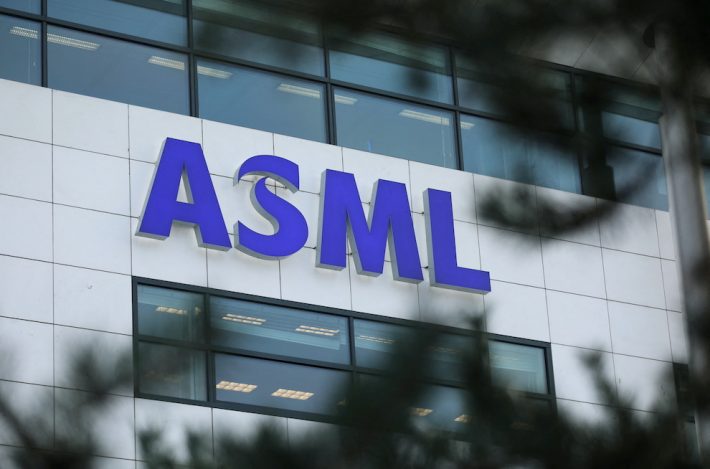


Dutch lithography giant ASML lost tens of billions in market cap – and its position as Europe’s most valuable tech company – after accidentally publishing its third quarter results slightly ahead of schedule on Tuesday.
The chip machines manufacturer suffered its biggest ever sell-off in decades and its market cap plunge by more than $65 billion after what it called a ‘technical error’.
ASML Holding NV published a press release containing its third-quarter earnings on its website, a half day earlier than planned, and it included a downgrade in sales and bookings forecasts for 2025, which it said was due to a slower than expected market recovery, geopolitical tensions and the possibility of additional regulations for fab tools sold to China.
It predicted total net sales of 30-35 billion euros in 2025, which is near the bottom of its last forecast. And that spurred a sell-off of stocks all across the chip sector.
The sell-off saw ASML shares drop by 16% on Tuesday and 5% on Wednesday – its biggest slump since 1998 – and led to German software firm SAP claiming the title of Europe’s top tech company.
On Thursday afternoon, ASML, which is listed on the Euronext exchange in Amsterdam, had a market cap of 235.5-billion euro, while SAP, which is listed on the Gettex exchange in Munich, was valued at 246.3 billion.
ASML issued a statement on Wednesday, saying that it reached out to the relevant financial authorities immediately following the incident.
A spokesperson for the Netherlands’ Financial Markets Authority (AFM) told Reuters it could not comment on whether it would investigate the matter, as it is bound by law not to disclose its conversations with firms.
“An important point is that information must be distributed to shareholders at the same time,” the spokesperson said.
ASML CEO Christophe Fouquet apologised on a call with analysts on Wednesday, calling it “unfortunate” given the seriousness of the forecast downgrade.
The Netherlands’ shareholder organization VEB reacted with dismay to the disclosure, but noted it was not the early disclosure, but the bad news, that led to the share sell-off.
“For a company which is the largest listed company in the Netherlands and also the leading technology company in Europe… it is not what we would expect from ASML,” VEB head Gerben Everts said in an interview.
“They must be ashamed that this happened and that it was so prominently in the news.”
ASML had a similar incident during its 2022 investor day, when an SEC filing on the company’s outlook was published ahead of the Dutch schedule, Reuters said.
Everts, himself a former AFM board member, said he did not believe shareholders have cause to sue for damages over the incident, or that the AFM will eventually issue any penalty worse than ASML’s public embarrassment.
But he took issue with ASML labelling the incident a technical error. “This is a human mistake,” he said. “Everybody makes mistakes.”
Meanwhile, analysts said that ASML’s lower forecast pointed more to chip factory overcapacity, rather than a drop in global demand for chips.
The weaker outlook could, instead, reflect some overcapacity at chip factories that had already stocked up on ASML’s pricey tools during the pandemic and have become better at using them to produce a larger numbers of chips, analysts told Reuters.
Leading chipmakers such as TSMC, Intel and Samsung Electronics have all enjoyed a boom in demand because of heightened interest in AI and that has seen them ramp up capacity.
ASML’s forecast was a lagging indicator of what has been playing out at these chip factories for months, they said.
The company said in its statement that despite a boom in AI-related chips, other parts of the semiconductor market were weaker for longer than expected, leading companies that make logic chips to delay orders and customers that make memory chips to only plan “limited” new capacity additions.
Intel, TSMC and Samsung are pulling back on orders from ASML because they have realized there is plenty of capacity, Dan Hutcheson, vice chair at analyst firm TechInsights, said.
Chip factory usage is around 81% this year, but manufacturers tend to buy tools when that gets into the mid-90% range, Hutcheson said. Intel has slowed down its factory expansion, which suggests Samsung and TSMC will also be cautious, he said.
Chip stockpiles remain high, and chipmakers have become more efficient with ASML’s tools, meaning they can make more chips without having to order more.
Handel Jones, CEO of International Business Strategies, which tracks the chipmaking industry, has slashed the number of steps where ASML’s flagship machines are used, sometimes by almost a third.
Jones said Samsung, for example, may be able to use cutting edge chip-etching technology to reduce the number of steps using ASML’s flagship machines from five or six down to one or two.
If successful, Samsung could have significant excess capacity for those machines, known as extreme ultraviolet lithography machines, he said.
Jones said he had not changed any of his overall chip industry forecasts, which call for booming demand for AI chips and AI-specific memory chips.
“This is a short-term blip. In the long term, it’s going to be okay,” Jones said.
Spotlight on Big Tech’s Power and Water Use Amid AI Surge